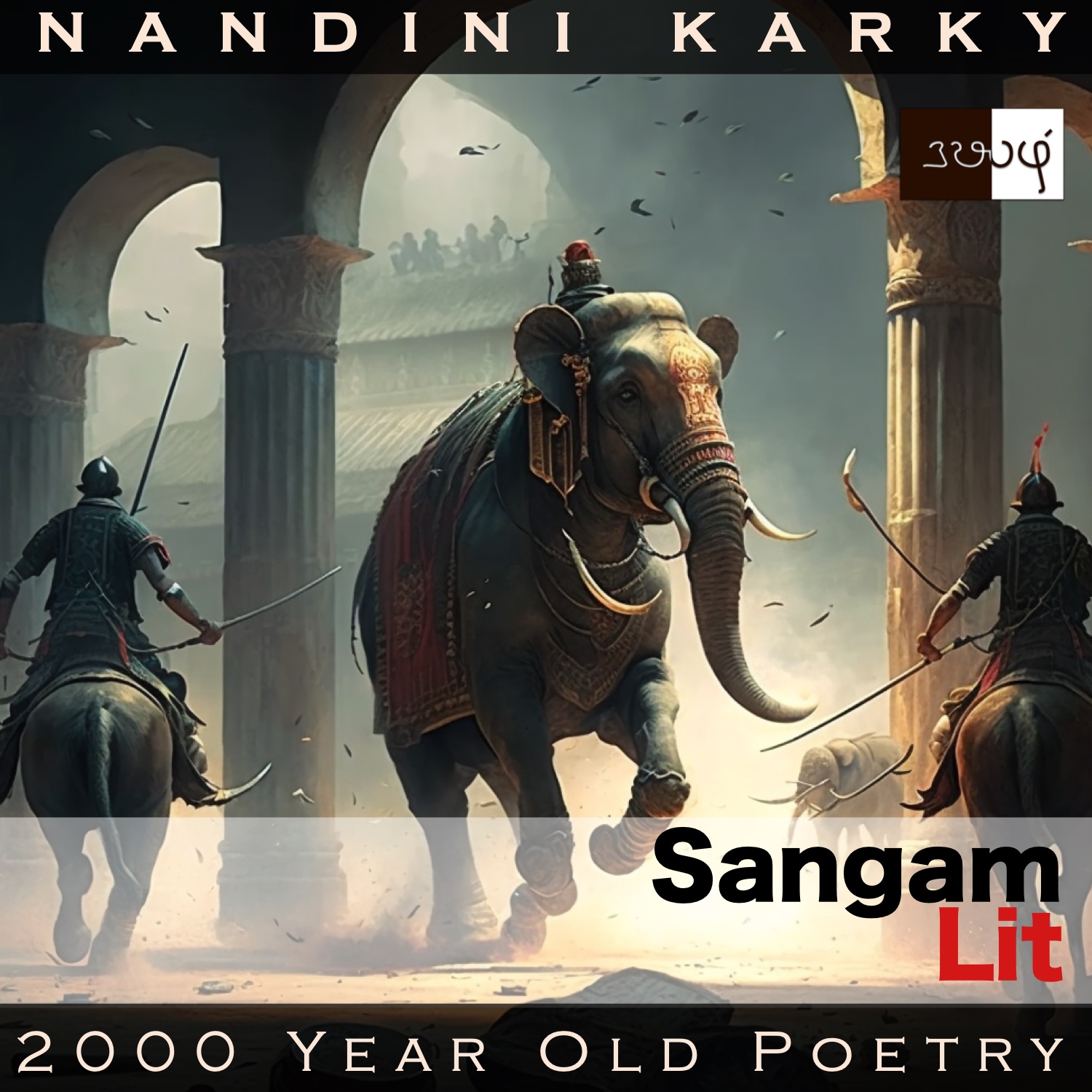Podcast: Play in new window | Download
Subscribe: Apple Podcasts | Spotify | Amazon Music | Android | iHeartRadio | Email | TuneIn | RSS | More
In this episode, we listen to a message of warning, as depicted in Sangam Literary work, Puranaanooru 97, penned about the Velir King Athiyamaan Nedumaan Anji by the poet Avvaiyaar. Set in the category of ‘Paadaan Thinai’ or ‘King’s praise’, the verse paints a vivid picture of the prowess of this king in a battlefield.

போர்க்கு உரைஇப் புகன்று கழித்த வாள்,
உடன்றவர் காப்புடை மதில் அழித்தலின்,
ஊன் உற மூழ்கி, உரு இழந்தனவே;
வேலே, குறும்பு அடைந்த அரண் கடந்து, அவர்
நறுங் கள்ளின் நாடு நைத்தலின்,
சுரை தழீஇய இருங் காழொடு
மடை கலங்கி நிலை திரிந்தனவே;
களிறே, எழூஉத் தாங்கிய கதவம் மலைத்து, அவர்
குழூஉக் களிற்றுக் குறும்பு உடைத்தலின்,
பரூஉப் பிணிய தொடி கழிந்தனவே;
மாவே, பரந்து ஒருங்கு மலைந்த மறவர்
பொலம் பைந் தார் கெடப் பரிதலின்,
களன் உழந்து அசைஇய மறுக் குளம்பினவே;
அவன் தானும், நிலம் திரைக்கும் கடல் தானைப்
பொலந் தும்பைக் கழல் பாண்டில்
கணை பொருத துளைத் தோலன்னே.
ஆயிடை, உடன்றோர் உய்தல் யாவது? ‘தடந் தாள்,
பிணிக் கதிர் நெல்லின் செம்மல் மூதூர்
நுமக்கு உரித்தாகல் வேண்டின், சென்று அவற்கு
இறுக்கல் வேண்டும், திறையே; மறுப்பின்,
ஒல்வான் அல்லன், வெல்போரான்’ எனச்
சொல்லவும் தேறீராயின், மெல் இயல்,
கழல் கனி வகுத்த துணைச் சில் ஓதி,
குறுந் தொடி மகளிர் தோள் விடல்
இறும்பூது அன்று; அஃது அறிந்து ஆடுமினே.
A long song that goes to show that Avvaiyaar was adept not only at crisp and intricate verses but even at the detailed ones! The poet’s words can be translated as follows:
“Swords, drawn out from their sheaths desiring a battle, in destroying the well-guarded forts of enemies, sank into flesh and lost their fine form;
Spears, crossing over the fortresses of opponents, in ruining their country renowned for its fragrant toddy, losing the nails that bridge long stems to spear edges, became dislocated;
Elephants, dashing against fort doors bolted with crossbars, in breaking the resistance of elephant herds guarding enemy forts, lost the ornamental bangles on their tusks;
Horses, spreading around, leaping all over the battlefield and ruining golden garlands of enemy soldiers, stained their hooves red;
As for him, with an army as huge as an ocean that encompasses all land, wearing a garland of ‘thumbai’ flowers, he holds a shield, which is shaped like an anklet and a bowl, and ends up stitched with arrows many;
Considering all this, how can his enemies ever escape from him? So, I say unto you, ‘If you need to hold on to your ancient and famous towns filled with prosperous paddy, having tangled roots and curving stems, as your own, you need to go and render unto him, the due taxes. If you refuse, he will not accede to your stance – that conqueror of battles’
Even after this, if you do not change your ways, then there will be nothing surprising in the outcome that you shall part away from the fine shoulders of your gentle women, who wear small bangles and have short bunches of hair separated and rolled with seed-like jewels many;
And so, know this, and then, wage your war!”
Let’s explore the images presented herein. The poet narrates about the state of swords, spears, elephants, horses and the king himself at the end of a war with his enemies. In an extension to a previous song where she talks about how bent and out-of-shape Athiyamaan’s spears are, to alarm an adversary of his, here, the poet talks about how the swords have lost their shine dipping into the flesh of enemies, spears have lost their nails and their form. From inanimate objects, she then turns to battle animals and talks about how wild elephants in the king’s army, in their ceaseless attack of enemy forts, have lost the well-fitted ornaments on their tusks, whereas his horses in their running around the battlefield have got their hooves coated with the red of enemy blood. As the final image in this sequence of war shots, the poet zooms on to the king, who is standing there tall and proud, a shield in his hand, stitched with the flying arrows of opponents.
Given all these realities from his past battles, could there even be a slim chance for his enemies to escape unscathed, the poet asks, with an implicit and vehement ‘No’! Then, she turns to the people whom she has been saying all this and says that if they want to hold on to their fertile and ancient towns, then they need to go pay their taxes to King Athiyaman. She adds that they must do this because the king is not someone who will accept their refusal to render his due. Then, she looks at them and says, even after all this, if they do not understand the intensity of the situation, then the obvious outcome was for them to depart forever from the loving arms of their maiden. In describing the women in this enemy country, the poet lets us peer into their sense of fashion and gives specific details about the way these women used to part their hair into bunches and roll them with seed-shaped jewels. An ancient equivalent of rollers women use even now to add bounce and curls to their hairdo! Returning to the verse, we find the poet parting with the final shot to these enemies that they need to fully take in all this, and then, raise their spears against King Athiyamaan!
The poet continues in her role of averting wars by extolling the skill of this king in battle. She paints the king as an impossible person to defeat and makes the listening enemies think their idea to wage war against him is a futile and fatal exercise. Looking back from the present, even if she succeeded once or twice in avoiding such battles from happening, imagine the number of lives saved – not only human but also elephants and horses. Here’s wishing more power to people like her today, the diplomats of peace, in their mission to save lives and change the course of history forever!




Share your thoughts...